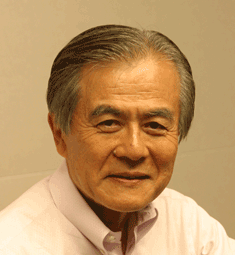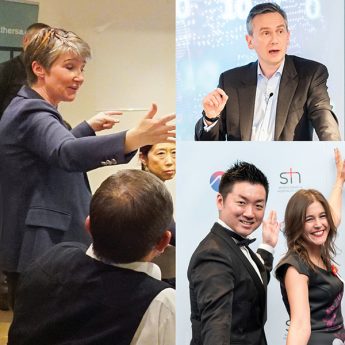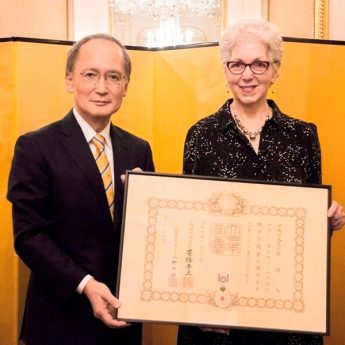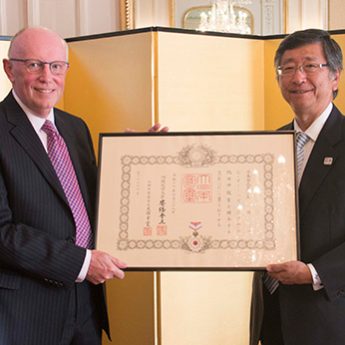Tokyo engineer will help judge Queen’s new £1mn industry prize
- David Cameron announced the new award
- The queen will personally award the prize
- Managed by Royal Academy of Engineering
- Gong for global innovation for mankind
As an engineer at heart, Hiroshi Komiyama feels that his profession holds the key to a more sustainable and comfortable life for mankind.
He is delighted that a new UK prize recognises the importance of the work that engineers do.
The UK government announced in November last year that, in the spring of 2013, it will award the first Queen Elizabeth Prize for Engineering, for which a panel of judges from around the world will identify a groundbreaking innovation that is of global benefit to mankind.
The prize—accompanied by a cheque for an impressive £1mn—will be awarded biennially by Queen Elizabeth II in London and managed by a team at the Royal Academy of Engineering.
The amount of prize money and the prestige attached to the queen’s involvement are designed to make the award as respected and coveted as the Nobel Prizes.
“It’s very important that Queen Elizabeth is giving away the awards herself, and at Buckingham Palace, because it shows just how important science is”, Komiyama, one of the 15 judges, told BCCJ ACUMEN.
“But it’s more than that; finding the Higgs boson particle is a very important achievement, but it has very little to do with our everyday life”, he said. “We need to solve problems and find the answers to challenges that we are facing now.
“We need, for example, inventive solutions to global warming or sustainability”, he added. “We need those solutions now and I hope this award will help bring that about”.
Komiyama is chairman of Mitsubishi Research Institute Inc. and a former president of The University of Tokyo, but began his career as a petrochemical engineer.
“I feel the gap between academia, industry and business is widening, and that complicates the social issues that we are facing”, he said. “Compartmentalisation in academic fields means that it is harder to make scientific or technical discoveries with real applications.
Mankind has accumulated vast amounts of knowledge in an amazing array of scientific disciplines, but it remains too dispersed to be effective.
“Someone—or something, like this new prize—needs to fill those gaps”, Komiyama revealed.
Supported by all of the UK’s political parties, Prime Minister David Cameron announced the launch of the award at the Science Museum in London.
Cameron said that the “consequence” of failing to recognise the contribution that engineers make to society is that too few young people—particularly in the UK—consider engineering to be an attractive career option.
“This is the country that gave the world the industrial revolution”, Cameron said. “Our engineering changed the world. And it’s not just part of our past. We are very good at it today”.
Cameron pointed out that UK engineering firms have taken the lead on landmark schemes around the world: the Sydney Opera House; London 2012 Olympic and Paralympic Games projects; and the Crossrail Ltd underground rail scheme.
“[Crossrail] is as dramatic as anything done by their Victorian predecessors”, Cameron said.
Nick Clegg, deputy prime minister and Liberal Party leader, added: “What is so significant is that [the prize] challenges us to rethink our self-perception as a country.
“There has been this hidden assumption that we are a country of accountants and lawyers”, Clegg said. “We must stop talking ourselves down. We are a nation of great engineers”.
Donors to the prize money include: BAE Systems plc, BT Group plc, BP plc, GlaxoSmithKline plc, Jaguar Land Rover, National Grid and Royal Dutch Shell plc, as well as Japanese industry giants Sony Corporation and Toshiba Corporation.
The judges will be asked to select an outstanding engineering-led advance that has produced “tangible and widespread public benefit”.
“This does not mean that only ‘life-saving’ applications will be recognised”, the criteria states. “Engineering shapes culture and creates culture shift: it inspires, informs, educates and entertains. Engineering helps us meet global challenges and also underpins every aspect of day-to-day life”.
Komiyama believes there are similarities between the Queen Elizabeth Prize for Engineering and both the Japan Prize and the Kyoto Prize—awarded annually to scientists and engineers from around the world who have made significant contributions to the advancement of science and technology. However, the prize money on offer for the Queen Elizabeth Prize far outstrips that of the Japanese awards.
“I believe that engineers should be admired more in society and that is why this new award is important”, he said. “I see The Royal Academy of Engineering as having been very brave in announcing this prize and I have the utmost admiration for the country for taking this step”.
Details: http://qeprize.org/







